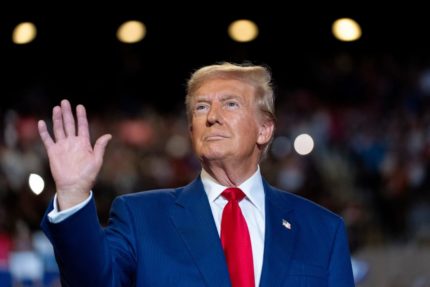President-elect Donald Trump has been actively considering measures to prevent Iran from developing nuclear weapons. Sources close to the former president revealed that Donald Trump is weighing a variety of military and diplomatic options. Among these options is the possibility of preventive airstrikes, a move that would significantly escalate tensions in the Middle East. This approach reflects Donald Trump’s longstanding stance against Iran’s nuclear capabilities, which he viewed as a threat to global stability during his time in office.
Donald Trump’s advisers have reportedly discussed the potential consequences of such airstrikes, including retaliatory actions from Iran and the impact on international relations. The former president, who withdrew the United States from the Iran nuclear deal in 2018, has maintained that Iran’s nuclear ambitions pose an existential threat to the region and beyond. This latest development underscores his ongoing hardline approach to foreign policy, particularly concerning countries that seek nuclear weapons.
Rising Tensions Between the U.S. and Iran
Tensions between the United States and Iran have been escalating for years, particularly following the U.S.’s withdrawal from the Iran nuclear deal. This agreement, originally signed in 2015, was intended to limit Iran’s nuclear activities in exchange for sanctions relief. However, Trump’s decision to exit the deal significantly altered the dynamics of U.S.-Iran relations, leading to increased hostilities and renewed fears of a nuclear arms race in the Middle East.
The situation has worsened with Iran’s continued development of its nuclear program, which many experts argue is a direct violation of the spirit of the original agreement. In recent months, both countries have engaged in tit-for-tat military actions, further stoking fears of a full-blown conflict. While diplomatic efforts continue, Donald Trump’s rhetoric and possible military actions, such as airstrikes, have raised the stakes considerably.
The Potential Impact of Preventive Airstrikes
The idea of preventive airstrikes has been a controversial subject in both military and political circles. Proponents argue that such a measure would be a necessary response to Iran’s nuclear progress, potentially stalling or dismantling critical facilities before they can be fully operational. Preventive strikes could send a clear message to Iran and other nations pursuing nuclear capabilities that the international community will not tolerate nuclear proliferation in volatile regions.
On the other hand, critics warn that such an action could provoke significant retaliation from Iran, potentially destabilizing the entire Middle East. The Iranian government has repeatedly stated that it views its nuclear program as peaceful and a vital part of its national security. A military intervention by the U.S. could escalate tensions to the point of an all-out war, with consequences that could affect not only the Middle East but also global energy markets and security.
The Global Community’s Response to Donald Trump’s Proposal
The international community has been closely monitoring developments surrounding Iran’s nuclear program, with mixed reactions to Donald Trump’s potential plan for preventive airstrikes. European leaders, who were signatories to the original Iran nuclear deal, have expressed concerns about any further military intervention in the region. They have called for renewed diplomatic efforts and a return to the negotiating table, believing that military strikes would only worsen the situation and alienate Iran from the global diplomatic community.
In contrast, Israel, a close ally of the United States, has long been an advocate for military action against Iran’s nuclear facilities. Israel perceives a nuclear-armed Iran as a direct existential threat and has expressed support for any measures, including airstrikes, that would neutralize Iran’s nuclear capabilities. The U.S. and Israel have often coordinated on military strategies in the region, and Donald Trump’s proposal may be seen as aligning with Israeli interests.
The Political Ramifications for Donald Trump’s 2024 Campaign
Donald Trump’s aggressive stance on Iran’s nuclear ambitions is likely to play a significant role in his 2024 presidential campaign. His firm foreign policy positions, particularly on national security and defense, are central to his political brand. If Donald Trump were to propose or even enact military measures against Iran, it could solidify his support among hardline conservatives and those who believe that only strong leadership can deter Iran’s nuclear ambitions.
However, such actions could also alienate moderate voters and lead to backlash from critics who accuse Donald Trump of recklessly endangering international stability. The stakes are high, as Trump seeks to regain the presidency and navigate the complex geopolitical landscape. His handling of Iran’s nuclear threat may become a pivotal issue in shaping voter opinions and influencing the outcome of the 2024 election.
Future of U.S.-Iran Relations Under Donald Trump’s Strategy
If Donald Trump were to return to the White House, his approach to U.S.-Iran relations is likely to remain firm and uncompromising. His strategy could involve a combination of military deterrence, economic sanctions, and diplomatic pressure to force Iran into compliance with international norms. Donald Trump’s philosophy is rooted in the belief that strength, rather than diplomacy, is the key to securing peace in the region.
The future of U.S.-Iran relations will depend on a delicate balancing act between military action and diplomatic negotiations. While Donald Trump’s critics argue that his methods are too extreme, his supporters contend that only through decisive action can the U.S. prevent a nuclear-armed Iran. The coming months will be critical in determining whether the world is headed toward further conflict or if diplomatic solutions can still prevail.














